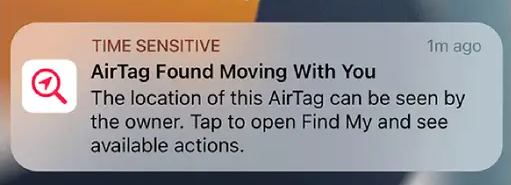Each year, an estimated 13.5 million people in the US are victim to stalking. This is a worrying fact stated in the introduction of a lawsuit against Apple brought by stalking victims who charge that AirTags empowered their abusers.
AirTags are marketed as trackers that allow you to easily find lost belongings like keys and luggage. If you lose an object, you can find the AirTag in the Find My app on another Apple device. The tracker transmits its location via Ultra Wideband technology which is more accurate than Bluetooth when it comes to determining exact location. Since the tracker shares its location with the Apple devices of others, you can also find your AirTag over large distances.
AirTags are relatively cheap ($29), small (1.29”/3.19 cm) and can run for about a year before they need the battery replaced. This makes them an ideal tool for stalkers—they just need to attach one to something that they expect you to keep with you.
An important part of a negligence claim is whether the manufacture could have foreseen the issue—in this case, the stalking issue. This shouldn’t be a problem since lots of people were screaming from the rooftops that Apple was basically putting out a product for stalkers.
From the suit:
“Prior to and upon the AirTag’s release, advocates and technologists urged the company to rethink the product and to consider its inevitable use in stalking. In response, Apple heedlessly forged ahead, dismissing concerns and pointing to mitigation featured that it claimed rendered the devices ‘stalker proof.’”
One plaintiffs’ lawyer argued that Apple did not make it possible, at the time the victim was stalked, for people being followed to locate an unwanted AirTag.
When the judge asked what Apple could have done better, the lawyer acknowledged that Apple has since made many fixes, but victims should have been alerted they were being subjected to unwanted tracking more quickly.
How do the improvements Apple made help victims?
Since AirTags were introduced, Apple has made some changes that can help potential stalking victims.
The most important one is that someone is now able to find out if an AirTag that they don’t own is moving with them over time.
On iPhones and iPads this is enabled by default, but it doesn’t hurt to check, especially if somoene may have had access to your device.
To make sure these options are enabled:
- Go to Settings > Privacy & Security > Location Services: Location Services should be on
- Under Location Services > System Services > Find My iPhone/iPad: Significant Locations should be on.
- Under Settings you also need to make sure you’re not in Airplane Mode and Bluetooth is on.
- Open the Find My app, open the Me tab, and make sure Tracking Notifications are turned on.
If an unknown AirTag is following you, you’ll see an alert like this:

In the Find My app, you’ll be able to see how long the AirTag has been with you and you can use the Play Sound option to have the tracker emit a noise, which can help you find it.
For Android owners, Google has created a similar anti-stalking feature. Please note that the path to find the appropriate settings may vary with vendors and Android versions, but this should give you a good idea:
- Select Settings > Safety and emergency > Unknown tracker alerts. Here you can allow alerts and do a manual scan for nearby trackers.
An unknown tracker alert is sent when someone else’s tracker device is separated from them and detected to be traveling with you and out of Bluetooth range from the owner. You can trigger any found AirTag to make a sound and you’ll be able to see how long it’s been with you on a map.
There are plans to broaden the scope of the tracker alerts besides AirTags. Companies including Samsung, Tile, Chipolo, Eufy, and Pebblebee have expressed interest in supporting this technology.
We’ll keep an eye on the lawsuit and let you know how it progresses.
